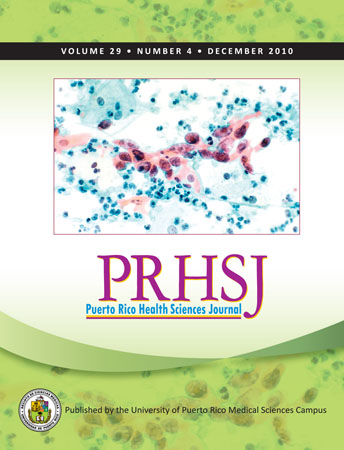Abstract
Objective: Cervical cancer was the leading malignancy among women in Puerto Rico when the Central Cancer Registry was first established by law in 1950. The screening program for cervical cancer in PR was initiated in 1961 when cytological laboratories were established in regional hospitals throughout the island, reaching its peak in 1973. In 2004, invasive cervical cancer ranked fifth among the top cancers in women in PR, representing 4% of all newly diagnosed cancers and 2% of all cancer related deaths among women. The purpose of this study was to evaluate the incidence trends of cervical cancer by histology type in PR. Methods: Cervical cancer cases (n = 3,516) diagnosed from 1987-2004 were obtained from the Puerto Rico Central Cancer Registry. Age-adjusted and age-specific incidence rates by histological type were calculated. Annual percent changes were estimated to evaluate the incidence trends from 1987 to 2004. Results: From 1987 to 2004, the incidence of cervical cancer showed a downward trend (APC = -2.1%). Seventy-six percent (76.3%) of invasive cervical cancer cases were squamous cell carcinoma (SCC), 15.4% were adenocarcinoma (ADC), and 8.3% had other histologies. When histology was considered, a decreasing trend was observed for the incidence rates of SCC (APC = -3.2%, p < 0.05), with the greatest decrease being seen in women aged 60-74 (APC = -6.6%, p < 0.05). While the overall incidence rate of ADC remained stable (APC = 0.8%, p > 0.05), it increased in women aged 30-44 (APC = 3.8%, p < 0.05). Conclusion: Overall, the incidence rates for cervical cancer (SCC in particular), have decreased in PR. However, ADC does not present a similar decreasing trend. This trend, which is similar with other populations, could be explained, in part, by a decreasing prevalence of risk factors. Nevertheless, analysis by specific age group shows variations in the risk, which need careful consideration since they could imply changes in factors associated with each of the histological types.
Authors who publish with this journal agree to the following terms:
a. Authors retain copyright and grant the journal right of first publication with the work simultaneously licensed under a Creative Commons Attribution License that allows others to share the work with an acknowledgement of the work's authorship and initial publication in this journal.
b. Authors are able to enter into separate, additional contractual arrangements for the non-exclusive distribution of the journal's published version of the work (e.g., post it to an institutional repository or publish it in a book), with an acknowledgement of its initial publication in this journal.
c. Authors are permitted and encouraged to post their work online (e.g., in institutional repositories or on their website) prior to and during the submission process, as it can lead to productive exchanges, as well as earlier and greater citation of published work (See The Effect of Open Access).
